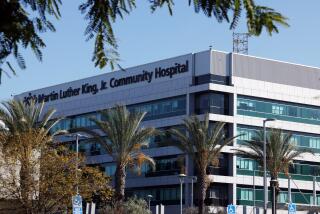Nonprofit hospitals face state hearing on tax-exempt status
A California state auditor’s report shows that nonprofit hospitals have significant leeway in determining how much charity care they provide to the neediest patients.
A state Senate committee will discuss that issue and others at a hearing Wednesday as part of the debate over whether nonprofit hospitals do enough to justify their tax-exempt status.
Critics have said some nonprofit hospitals skimp on charity care while amassing large reserves and paying hefty salaries to executives. Some nonprofit hospitals have also come under scrutiny for aggressive collection practices against the uninsured over unpaid medical bills.
California law requires most tax-exempt hospitals to submit information annually on their “community benefits” through free or partial charity care and other means.
But state law doesn’t require nonprofit hospitals to deliver specific amounts of uncompensated care and other community benefits in order to qualify for their tax-exempt status, according to state auditors.
“Communities across California are served by nonprofit hospitals, and we need to make sure they are honoring their commitment to serve the public that comes with their special tax-exempt status,” said state Senate Majority Leader Ellen Corbett (D-San Leandro), who requested the audit last year.
In addition to providing free care to many of the uninsured, hospitals say they also incur millions of dollars in uncompensated care because of low reimbursements from government health programs, such as Medicaid and Medicare.
Sutter Health, a large nonprofit hospital chain in Northern California, said it provided $756 million in community benefit programs and services last year.
At the federal level, the Internal Revenue Service has required nonprofit hospitals to provide additional information on their tax returns regarding their charity care work.
The state audit found that 15 nonprofit hospitals had not reported their community benefit plans for 2010 as required by law, but it didn’t identify those hospitals.
ALSO:
Many hospitals, doctors offer surprising cash discounts
Patient data outage exposes risks of electronic medical records
41% of California hospitals graded C or lower on patient safety
Follow Chad Terhune on Twitter







